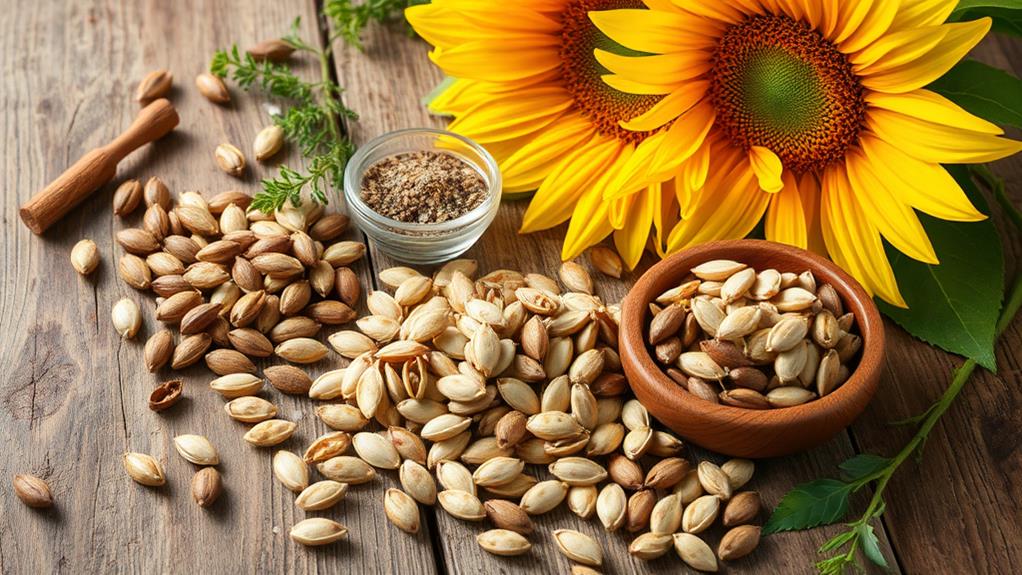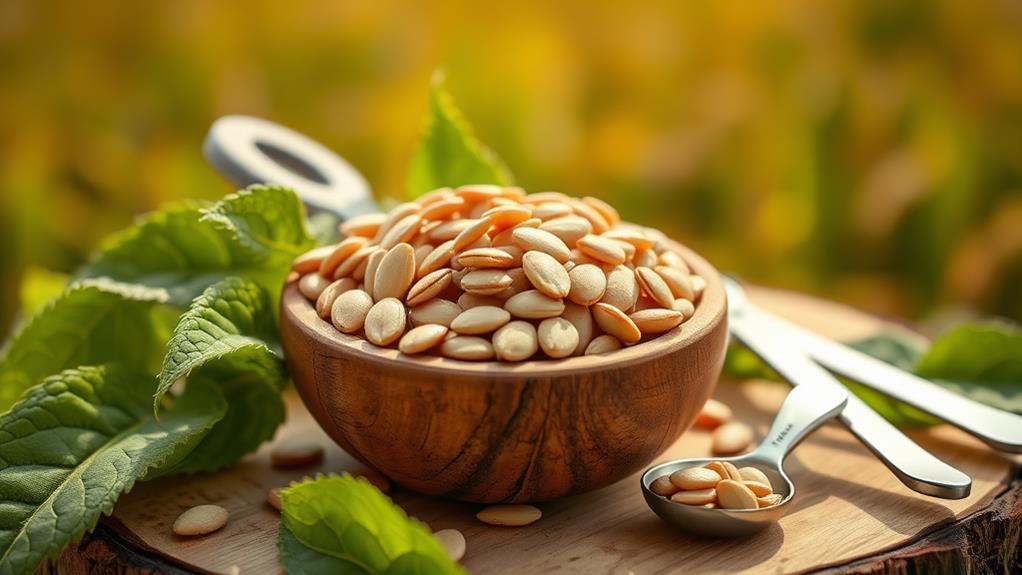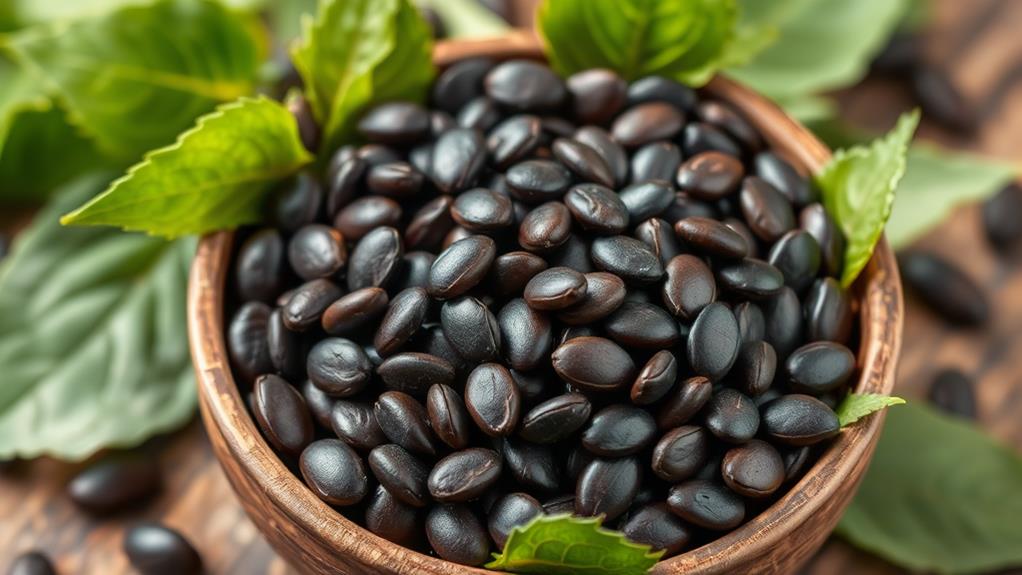Sunflower seeds are keto-friendly because they contain less than 4 grams of net carbs per serving, fitting easily within your daily carb limits. They offer a high-fat profile, with about 70-80% of their calories coming from fat, which is essential for a ketogenic diet. Additionally, they provide moderate protein and are packed with vitamins and minerals that enhance overall health. Their dietary fiber helps with digestion and keeps you feeling full. Just be mindful of portion sizes to stay in ketosis. There's plenty more to discover about how to incorporate them into your meals!
Sunflower Seeds and Keto Compatibility
When it comes to following a ketogenic diet, sunflower seeds are a fantastic option due to their low net carb content. With less than 4 grams of net carbs per 1/4 cup serving, you can easily fit them into your daily carb limits, which typically range from 20-50 grams. This makes sunflower seeds an excellent choice for snacking or adding to meals without jeopardizing your ketosis. Additionally, pairing sunflower seeds with high-fiber low-carb vegetables like broccoli and spinach can further enhance your nutritional intake.
Furthermore, the high fat content of sunflower seeds—approximately 70-80% of their calories—aligns perfectly with the macronutrient ratios of a ketogenic diet. In a 30-gram serving, you'll find about 3.9 grams of net carbs, allowing for mindful consumption while still meeting your dietary goals. Plus, they provide around 5.8 grams of protein, which supports the moderate protein requirements of keto.
Incorporating sunflower seeds into your meal plan not only keeps your carb count in check but also offers a nutrient-dense profile. They contain essential vitamins and minerals that can support your overall health while you adhere to your ketogenic diet.
Enjoy sunflower seeds as a crunchy snack or sprinkle them on salads to enhance your keto-friendly meals!
Nutritional Profile of Sunflower Seeds
When you look at the nutritional profile of sunflower seeds, you'll notice a balanced macronutrient breakdown that's ideal for ketogenic eating.
They're packed with essential vitamins and minerals, including vitamin E, which serves as a potent antioxidant, and their high fiber content supports digestive health.
Packed with nutrients like magnesium, iron, and zinc, this combination makes sunflower seeds a smart choice for your keto-friendly meals.
Macronutrient Breakdown
Packed with essential nutrients, sunflower seeds boast a macronutrient profile that aligns perfectly with ketogenic dietary needs. Their impressive macronutrient breakdown makes them a fantastic addition to your keto meal plan.
Here's what you can expect from a 30g serving of sunflower seeds:
- High Fat Content: With about 15g of fat, sunflower seeds provide around 65% of their total fat from omega-6 fatty acids, which is vital for meeting keto's high-fat requirements.
- Moderate Protein: You'll get about 5.8g of protein, making them a great source of plant-based protein that complements your diet.
- Low Net Carbs: At only 3.9g of net carbs per serving, sunflower seeds allow you to enjoy a crunchy snack without exceeding your daily carbohydrate limits.
This combination of macronutrients not only supports your energy needs but also keeps you satiated, helping you stay on track with your ketogenic goals.
Incorporating sunflower seeds into your meals can enhance your keto journey while providing essential fats and minimal carbs.
Essential Vitamins and Minerals
Sunflower seeds not only provide a beneficial macronutrient profile but also pack a powerhouse of vitamins and minerals that can enhance your overall health. With about 35.17mg of vitamin E per 100g, these seeds support antioxidant activity and cellular health, making them an excellent addition to your diet.
They're also rich in magnesium, offering 325mg per 100g, which is vital for over 300 biochemical reactions in your body, including energy production and muscle function.
If you're concerned about iron intake, sunflower seeds deliver 4.37mg of iron per 100g, aiding oxygen transportation and helping prevent anemia—especially important if you're following a plant-based diet.
Additionally, sunflower seeds provide a significant amount of copper, contributing 61% of the daily value in just 100g. This mineral is essential for red blood cell formation and maintaining healthy bones and nerves.
All these nutrients come alongside healthy fats, making sunflower seeds a smart choice for a keto-friendly lifestyle. By incorporating them into your meals, you can easily boost your intake of essential vitamins and minerals while enjoying a delicious snack.
Fiber and Digestive Health
A mere 30g serving of sunflower seeds offers about 3.3g of dietary fiber, making them a smart choice for enhancing your digestive health. This fiber content can play a significant role, especially if you're adjusting to a low-carb diet.
Here's how sunflower seeds can benefit your digestion:
- Promotes Satiety: The fiber helps you feel full longer, which can be beneficial on a ketogenic diet.
- Prevents Constipation: The high fiber content, particularly insoluble fiber, adds bulk to your stool and can help regulate bowel movements.
- Improves Blood Sugar Control: Fiber can also aid in stabilizing blood sugar levels, making sunflower seeds a great keto-friendly snack.
While these health benefits are impressive, remember that moderation is key. Overconsumption can lead to digestive issues, so enjoy sunflower seeds in reasonable amounts.
Health Benefits of Sunflower Seeds

When you include sunflower seeds in your diet, you're not just enjoying a tasty snack; you're also boosting your nutrient intake considerably.
Their rich anti-inflammatory properties and heart health benefits can support your overall well-being.
Sunflower seeds are also a great source of heart-healthy fats, which can help prioritizing heart-healthy fats in your ketogenic lifestyle.
Plus, their nutrient density makes them a perfect fit for your ketogenic lifestyle.
Nutrient Density Overview
Packed with nutrients, sunflower seeds offer a wealth of health benefits that align perfectly with a keto lifestyle. Their impressive nutrient density makes them a smart choice for anyone looking to enhance their diet with healthy options.
Here are three key benefits you'd enjoy by incorporating sunflower seeds into your meals:
- Healthy Fats: With 51.46g of fats per 100g serving, sunflower seeds are rich in unsaturated fats, which support heart health and help manage inflammation.
- Protein Boost: They provide 20.78g of protein per serving, making them a great addition for muscle maintenance and overall body function while keeping your protein intake in check.
- Low Carbohydrate Content: Containing only 20.0g of carbohydrates per 100g, sunflower seeds fit seamlessly into a low-carb diet, helping you stay within your daily carb limits.
Additionally, they're an excellent source of Vitamin E, magnesium, and selenium, which support immune function and cellular health.
Plus, with over 3g of dietary fiber, sunflower seeds promote digestive health and enhance satiety, making them an ideal snack or meal component in your keto journey.
Anti-Inflammatory Properties
Incorporating sunflower seeds into your diet not only boosts nutrient density but also offers significant anti-inflammatory properties. These tiny seeds are packed with vitamin E, a powerful antioxidant that reduces oxidative stress and inflammation in your body. By regularly consuming sunflower seeds, you can experience a range of health benefits, including lower inflammation levels.
Selenium, another key component of sunflower seeds, plays an essential role in reducing inflammation and enhancing your immune function. This means that by adding these seeds to your meals, you're supporting your overall health and resilience against inflammatory responses.
Additionally, sunflower seeds are rich in magnesium, which has been shown to exert anti-inflammatory effects and can help you manage chronic conditions linked to inflammation.
Moreover, the healthy fats found in sunflower seeds, particularly omega-6 fatty acids, can promote anti-inflammatory responses when balanced with omega-3 intake in your diet. By including sunflower seeds, you're not just enjoying a nutritious snack, but also taking a proactive step towards reducing inflammation and enhancing your well-being.
Embrace the health benefits of sunflower seeds and make them a regular part of your keto-friendly meals!
Cardiovascular Health Support
Sunflower seeds offer impressive support for your cardiovascular health, thanks to their rich nutrient profile. By incorporating these seeds into your diet, you're not just enjoying a tasty snack; you're also taking important steps to improve your heart health.
Here are three key benefits of sunflower seeds:
- Rich in Magnesium: Sunflower seeds are packed with magnesium, which helps maintain normal blood pressure and supports overall cardiovascular health.
- High in Vitamin E: The vitamin E content acts as a powerful antioxidant, reducing oxidative stress and inflammation—two factors closely linked to heart disease.
- Healthy Fats: With a significant amount of polyunsaturated fatty acids, sunflower seeds can help lower blood pressure and improve your lipid profile, ultimately reducing cardiovascular risk.
Regularly enjoying sunflower seeds can also help lower cholesterol levels and reduce homocysteine levels in your blood, both essential for preventing cardiovascular disease.
Potential Drawbacks of Sunflower Seeds
Often enjoyed as a nutritious snack, sunflower seeds do have some potential drawbacks that are worth considering. One significant concern is their high amounts of omega-6 fatty acids, primarily linoleic acid. If you consume sunflower seeds excessively, this can lead to inflammation in the body.
While they're a great source of healthy fats, it's crucial to balance your omega-6 intake with omega-3s for ideal health, as emphasized in the section about nutritional benefits of nuts and seeds.
Additionally, sunflower seeds contain about 1.6% phytic acid by dry weight, which may reduce the bioavailability of essential minerals like iron and zinc. If you're relying on these seeds for nutrients, this could be a drawback.
Another issue is their insoluble fiber content, approximately 6.3 grams per ½ cup serving. For some individuals, this high fiber content might cause digestive issues, including gut irritation.
Preparation Tips for Sunflower Seeds

When preparing sunflower seeds, consider sprouting them first to boost their nutritional value and reduce phytic acid content. This process not only makes them tastier but also enhances their bioavailability, allowing you to absorb more nutrients.
Additionally, incorporating healthy oils like coconut oil can further enhance the flavor and nutritional profile of your sunflower seed dishes.
Here are some preparation tips for sunflower seeds to maximize their benefits:
- Choose Whole Seeds: Opt for whole sunflower seeds instead of refined sunflower oil. Whole seeds retain their healthy fats, providing you with the benefits without unnecessary additives.
- Make Sunflower Seed Butter: Blend roasted sunflower seeds in a food processor to create your own sunflower seed butter. This tasty alternative is great for spreading on keto-friendly snacks or using in recipes.
- Mind Your Portions: Stick to a recommended serving size of 30 grams, which contains around 3.9 grams of net carbs. Use measuring tools to guarantee effective portion control, helping you stay within your daily carb limits while enjoying these nutritious seeds.
Incorporating Sunflower Seeds Into Meals
Incorporating sunflower seeds into your meals is a simple way to enhance both flavor and nutrition. With less than 4 grams of net carbs per ¼ cup, sunflower seeds fit perfectly into a low-carb ketogenic diet. You can easily sprinkle them on salads for a satisfying crunch or use them as toppings on keto-friendly baked goods, boosting both flavor and nutritional value.
Additionally, sunflower seeds are rich in healthy fats and protein, making them an excellent choice for a snack that supports overall well-being.
If you're looking for a creamy texture, blend sunflower seeds into your smoothies. A 30-gram serving adds about 15 grams of healthy fats and 5.8 grams of protein, making your drink more filling.
For an even healthier option, try sprouted sunflower seeds, which you can enjoy fresh or mix into various dishes. This method improves digestibility while enhancing the seeds' nutritional profile.
Don't forget about sunflower seed flour! It serves as a fantastic low-carb alternative in baking, perfect for creating keto-friendly breads and snacks.
Keto-Friendly Serving Sizes

When it comes to enjoying sunflower seeds on a keto diet, portion control is key.
A typical 30-gram serving offers a great balance of healthy fats and low net carbs, but it's easy to go overboard.
Let's explore recommended serving sizes and effective strategies to keep your carb intake in check while still savoring these nutritious seeds.
Recommended Serving Sizes
To stay on track with your ketogenic diet, it's essential to be mindful of portion sizes, especially with sunflower seeds. A recommended serving size of 30 grams contains approximately 3.9 grams of net carbs, which fits well within the typical daily carb limits of 20-50 grams.
Here are some key points to keep in mind:
- Stick to 30 grams: This serving size provides about 175 calories, 15 grams of fat, and 5.8 grams of protein, aligning perfectly with your keto macronutrient goals.
- Avoid larger portions: Consuming 100 grams of sunflower seeds can lead to 11.4 grams of net carbs, which might exceed your daily allowance and disrupt ketosis.
- Track your intake: Use a food diary or app to monitor your serving sizes, ensuring you remain within keto-friendly limits while enjoying sunflower seeds as snacks or toppings.
Portion Control Strategies
Maintaining portion control is essential for enjoying sunflower seeds while sticking to your ketogenic diet. A recommended serving size is about 30 grams, which contains roughly 3.9 grams of net carbs. This allows you to enjoy sunflower seeds without exceeding your daily carb intake, typically limited to 20-50 grams on a strict keto diet.
To keep your carb consumption in check, it's vital to track your daily net carbs. Sunflower seeds can quickly add up, so measure your servings to avoid accidental overconsumption. Using measuring tools or a food scale can help you stick to that 30-gram guideline.
You might also consider sprinkling a small amount of sunflower seeds on salads or incorporating them into dishes. This way, you enhance the nutritional value of your meals without exceeding your carb limits.
Incorporating sunflower seeds in moderation not only provides healthy fats and essential nutrients but also helps you maintain compliance with your keto dietary goals.
Alternatives to Sunflower Seeds
If you're looking for healthy alternatives to sunflower seeds, several options can fit seamlessly into your keto diet.
These low-carb substitutes not only satisfy your cravings but also provide essential nutrients to support your health.
Here are three great alternatives to sunflower seeds:
1. Chia Seeds: With only 2g net carbs per 100g, chia seeds are rich in omega-3 fatty acids.
They're perfect for adding to smoothies, yogurt, or even puddings.
2. Flaxseeds: Offering just 1.9g net carbs per 100g, flaxseeds are packed with fiber and lignans.
They make an excellent addition to baked goods or as a topping for salads.
3. Pumpkin Seeds: At 5g net carbs per 100g, pumpkin seeds are a nutritious substitute.
They're loaded with magnesium and zinc, making them great for snacking or adding to trail mixes.
Omega-6 Fatty Acids Considerations

Many people overlook the implications of omega-6 fatty acids in their diets, especially when it comes to foods like sunflower seeds. These seeds contain about 65% of their fat content as linoleic acid, a type of omega-6 fatty acid.
While omega-6 is essential for your health, the typical Western diet often skews heavily toward omega-6, which can lead to inflammation and other health issues if consumed in excess.
To maintain a balanced omega-6 to omega-3 ratio, moderation is important. If you're enjoying sunflower seeds, consider pairing them with omega-3-rich foods like chia seeds or flaxseeds. This strategy not only helps balance your fatty acid intake but also promotes better overall health.
Research suggests that excessive omega-6 consumption, including from sunflower seeds, could be linked to chronic diseases, making mindful consumption essential.
Impact on Digestive Health
Sunflower seeds not only offer healthy fats but also play a significant role in digestive health. Their impressive fiber content, with around 6.3 grams per ½ cup serving, promotes regularity and can help you feel full, potentially aiding weight management on a ketogenic diet.
However, it's crucial to enjoy them in moderation to avoid digestive discomfort.
Here are three key points about sunflower seeds and digestive health:
- Fiber Benefits: The high insoluble fiber content supports gut health and regular bowel movements, making it easier for your body to process food.
- Possible Irritation: Consuming too many sunflower seeds can lead to gut irritation due to excessive fiber, so listen to your body and adjust your intake accordingly.
- Nutrient Absorption: The presence of phytic acid can hinder the absorption of important minerals like iron and zinc if consumed in large quantities.
Sprouting seeds can help reduce these antinutrients, enhancing nutrient availability.
Conclusion
Incorporating sunflower seeds into your keto diet can be a game-changer for your snacking routine. With their low carb count and impressive nutrient profile, they'll make your taste buds dance like nobody's watching. Just remember to enjoy them in moderation to avoid any potential drawbacks. So, grab a handful and let these little powerhouses boost your health while keeping you on track with your keto goals. You'll feel like a nutrition superstar in no time!







